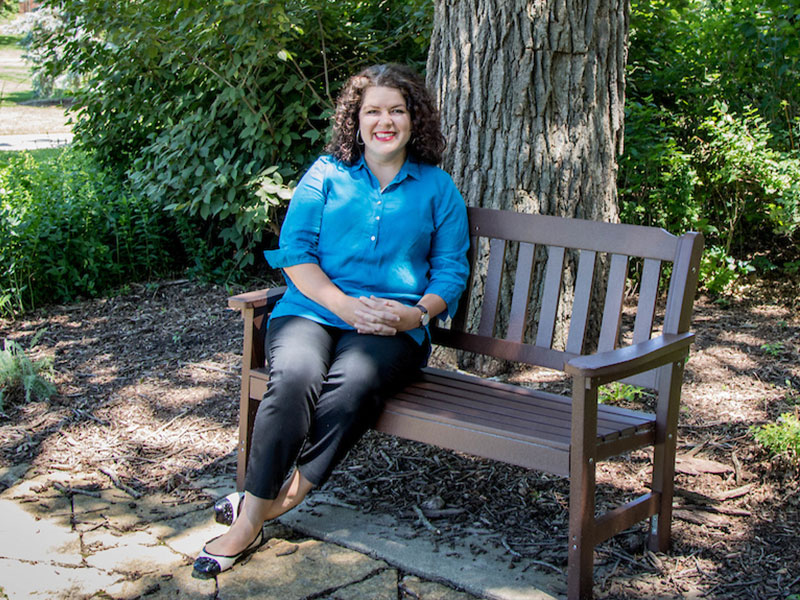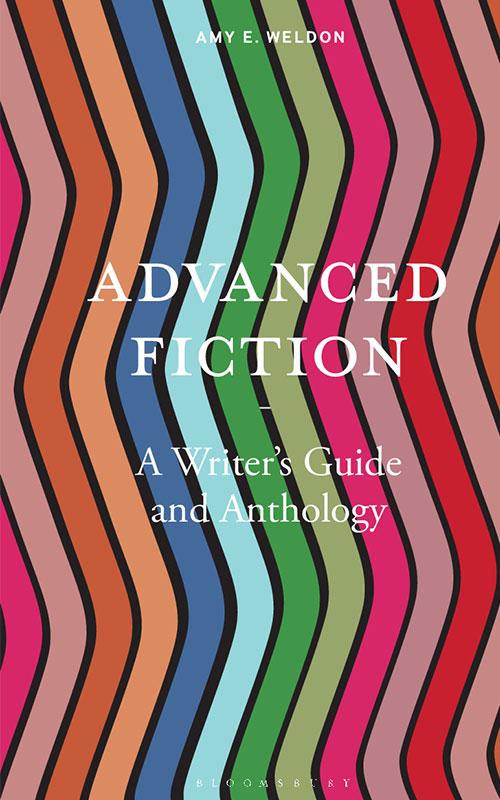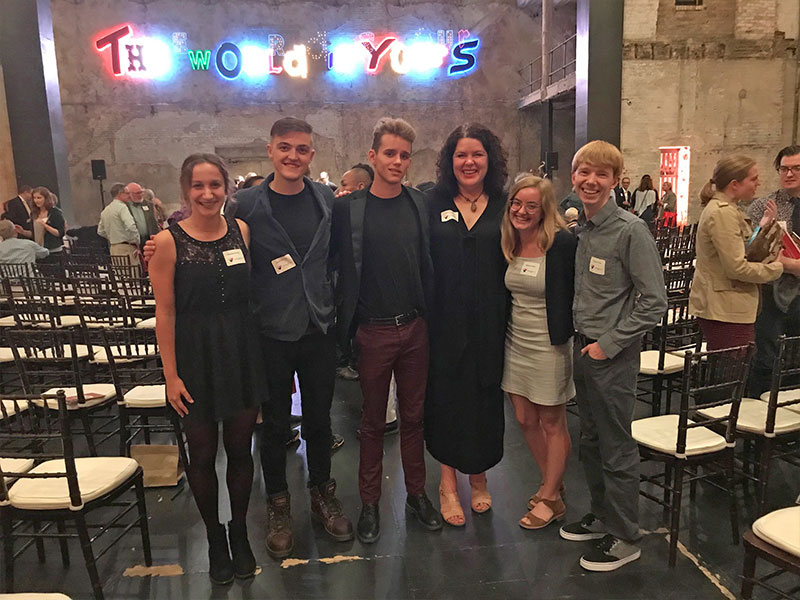Advanced Fiction—and Advanced Observation, Reflection, Connection, Curiosity, and Joy
One way to help students write with more impact is to teach them good technique. Amy Weldon, professor of English, set out to do just that in her latest book, Advanced Fiction: A Writer’s Guide and Anthology. Not only does it distill lessons from Weldon’s 20 years of teaching, it also features 10 Luther grads who bring those lessons to life.

Amy Weldon
A Lightbulb Moment Leads to a One-of-a-Kind Textbook
Around the time that Weldon decided to write the book, she was teaching an advanced fiction class of five students. The group had just completed an assignment to treat a figure of speech literally, as though it were actually happening. In a poignant, emotionally loaded story, Shannon Baker ’20 worked with the phrase “the elephant in the room.
“After those first couple of years, Sadie’s pans and spatulas grew to recognize just one set of hands. For the past year or so, while Dex clocked miles in the park, Sadie had kept her baking adventures alive with the help of the elephant. The elephant would hand her the whisk or the spatula when she needed it, sometimes holding onto it a second longer than necessary, forcing her to play tug-of-war with its trunk.”
—excerpt from “Habits” by Shannon Baker ’20
Weldon says, “I remember thinking: This is such a great example of subtext. And then the lightbulb went off over my head: This needs to be in the textbook. And then I thought: Why not gather more student writing?”
Weldon pitched the idea of highlighting student work to her editors. They were thrilled. The inclusion of student work, student reflection about that work, and student interviews was unique in the field. They’d never seen it done in a similar textbook.
The resulting volume is thoughtfully organized by common craft issues for advanced fiction writers, with Luther student writing illustrating most chapters. Weldon includes segments on organizing, risk-taking, writing the other, psychic distance and point of view, world-building, revising, and more.
Most of these issues, she says, start in the mind. And so the work that writers do in Weldon’s classroom—and that she asks writers to do throughout her book—is complex, extremely reflective, and sometimes existential. It matters beyond the page. As Weldon says, “Writing can be part of your life and a way you make meaning for yourself even if you never publish a word.”

Amy Weldon's textbook features work and reflection by Shannon Baker ’20, Levi Bird ’21, Annika Dome ’22, Reed Johnson ’16, Keith Lesmeister ’01, Derek Lin ’20, Joel Murillo ’17, Kari Myers ’08, Andrew Tiede ’19, and Ian Wreisner ’22, plus translation work by professor of English Lise Kildegaard.
Luther Writers Bring Technique to Life
One of the joys of Weldon’s book is journeying alongside budding Luther writers as they reflect on their creative process or move from early draft to finished prose.
Weldon’s chapter on “Mystery, Conviction, Form, and Risk” uses an excerpt from Levi Bird ’21 to illustrate risk-taking. While the excerpt itself is moving, Bird’s reflection on it is even more profound. He writes that venturing into risk is “an opportunity to truly sit and wrestle with your perspective and biases as an individual. It’s a chance to ensure that you do the characters of your story and the people who reflect those lived experiences justice. . . . The most important part of this writing was not just leaping into a risky topic and staring with wide eyes or a furrowed brow through the window at Tracy’s life; it was seeing my reflection through the window pane, questioning my own intention and identity as a writer, and deciding to take a risk.”
A chapter on psychic distance and point of view features writing from “Till Death” by Andrew Tiede ’19. The piece went through significant revision in class. Take a look at the incredible, punchy retooling of its opening sentence:
Before: “When I was young I hadn’t wanted to be a mortician.”
After: “As a kid, I thought this job was the stuff of nightmares.”
Chapter 6, “Building a World,” introduces us to “Fields of Ash” by Kari Myers ’08, who uses small, sensual details to tell the story of a tragic farm accident. In her reflection on creating an immersive sense of place, Myers writes, “I love the opportunity to revisit those ‘place makers’ and see if there are ones that can be brought more clearly into focus or deepened, that, more than sensory, point to a deeper layer of truth or theme in the story.”
The world-building chapter also illustrates some focused revision by Joel Murillo ’17 on his novella Cracker Jack, which transformed from a document that felt like an info-dump to a well-paced novella that showed, rather than told, a story. “I wanted to cover a world that could span 1,000 pages within 17,” he says. But after some deep work, he instead “provided puzzle pieces that readers could connect to arrive at their own conclusions.”

Weldon took a group of lucky students to the 2018 Graywolf Literary Salon, a fundraiser for prestigious independent Graywolf Press. Left to right: Shannon Baker ’20, Andrew Tiede ’19, Alexander Streitz ’19, Amy Weldon, Becca Buse ’19, and Connor Olson ’19.
Building Capacity On and Off the Page
If the work that Weldon prescribes asks a lot of writers, it also offers a big payoff. In Weldon’s book, a story by Ian Wreisner ’22, “The New Chicago,” illustrates “writing across the aisle” or writing from the point of view of your political opposite. “Ian wanted to separate his own stance from Richard’s without caricaturing Richard as a character or seeming to promote his views to the reader,” Weldon explains.
The balance that Wreisner reached in Weldon’s class continues to serve him in his work as a newspaper reporter today. He recently reflected: “I’m covering my home county of Anoka County, which has some incredibly diverse political opinions. I think about ‘presenting people as they’re seen’ every day I sit down to write, and it’s helped me not only write responsible news pieces, but turned some very ranting op-eds into measured responses to current events. Although I’m not necessarily writing ‘creatively’ when it comes to hard news, I use the skills taught to me in class every single day.”
Reed Johnson ’16, an internist at University of Iowa Health Care whose reflection is included in Weldon’s book, also applies advanced fiction technique to his profession. “At the core of being a good physician and a good writer,” he says, “is the ability to pay attention and notice.”
“Courses that these students took for ‘fun’ have actually put a foundation under their professional identity in ways they didn’t expect,” Weldon says. “That’s a benefit of what we do here at Luther—you get your payback five years, 10 years, 15 years down the road. Much like writing itself—I mean, it’s very seldom the case that you write something, it’s perfect, and it gets published.”
Speaking of publishing, two of the students featured in Weldon’s book went on to found literary journals. Derek Lin ’20 founded The Starter, and Keith Pilapil Lesmeister ’01 cofounded independent literary publisher Eastover Press and its offshoot journal, Cutleaf. Lesmeister has also published two books of fiction, We Could Have Been Happy Here and Mississippi River Museum.
Weldon hopes that seeing student work in her book—alongside household names like James Joyce, Colson Whitehead, and Rebecca Makkai—will help aspiring writers see that they offer something of value. “Once you’ve realized in any area of your life that you have something to contribute,” Weldon says, “that tends to bleed over into every other area of life too.”
She continues, “Looking at what’s coming up—climate dysfunction or water shortage, all the other things we worry about—this is the capacity that we’ve got to build as humans and that I’m hoping to build in my students and myself, which is take yourself seriously, take other people seriously, build the capacity to do the work on the regular. Writing is an arena in which you can practice that every day and see some results.
“This is why Luther matters. This is why college matters. Because this is the space where you practice and build those muscles for the world.”